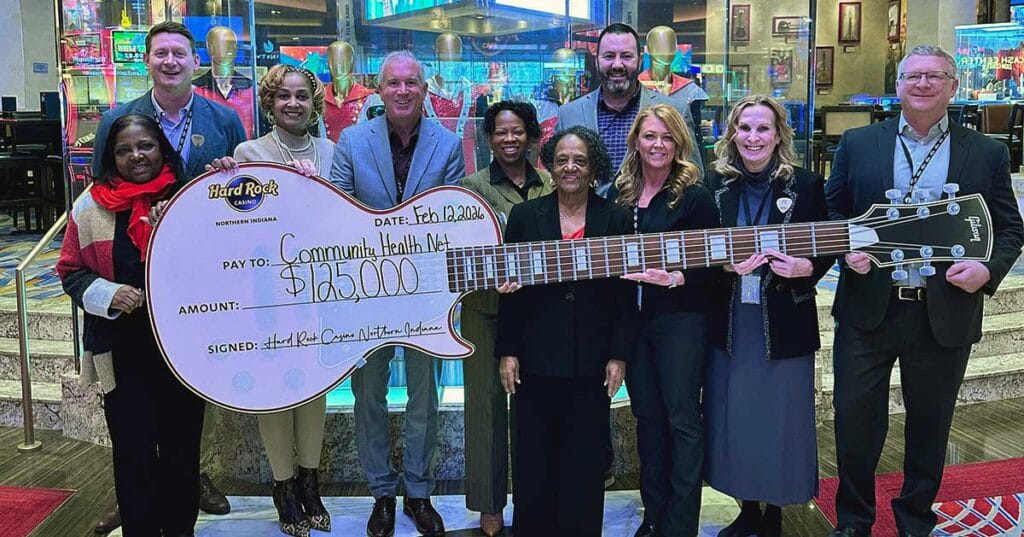Food manufacturers and distributors are always vigilant.
by Rick A. Richards
Tom DonLevy isn't concerned that the public has probably never heard of his company. The president of DonLevy Laboratories in Crown Point prefers a low profile.
If his lab's name pops up, that means there's a problem somewhere, and DonLevy doesn't want any of his clients to ever have a problem when it comes to food safety.
DonLevy is a microbiologist and has been involved with the food industry since the 1980s. He started his own company in 1992 in Merrillville with just three employees.
Today, DonLevy Laboratories is an independent commercial food testing lab that performs microbiological and chemistry analysis on facilities, raw food products and finished products for clients across the country. The company also performs sanitation audits, shelf-life evaluations and analysis of product integrity and regulatory compliance.
In 2005, DonLevy built a 22,000-square-foot food laboratory in Crown Point that today has 105 employees.

On the surface, it may seem simple to create a set of protocols for clients to follow in order to make sure their food products are safe.
“Unfortunately,” says DonLevy, “things are not that cut and dried. It depends on the building, the kind of equipment they use, all sorts of things. One size definitely doesn't fit all.”
When public announcements are made by the Food and Drug Administration that contaminated lettuce or tomatoes or bean sprouts or some other food has caused illness (or in some cases, death), that means there has been a failure in the food safety system somewhere.
DonLevy's goal is to prevent those kinds of failures and FDA involvement with a client.
“Identifying the root cause of a problem is difficult,” says DonLevy. “Each and every food borne illness has a cause. Our job is to find it and get rid of it.”
DonLevy says what he preaches to clients is the science of prevention, but it's up to clients to follow his advice. “For instance, when I deal with meat, I can guarantee it will be 100 percent safe when it reaches the store, but that might mean it would cost $50 a pound. No one can afford that.”
So what happens is a delicate balance of cost-effective safety and affordability. What can meat producers do to provide safe meat to consumers without pricing their product out of the reach of consumers?
The ultimate decision on food safety rests with the client, but DonLevy doesn't hesitate to make recommendations. Sometimes all of his recommendations are embraced, but other times, only some are put in place.
For a large multinational company that supplies a variety of foods, DonLevy's recommendation might mean $10 million in safety improvements that the company accepts without a second thought. But for a small, independent supplier, $10 million might be beyond its capability.
And for the companies that put DonLevy's recommendations in place, it's not as simple as it sounds. “Even within the same company, the recommendations that work at one facility might not at another. To make sure things work, I need to be in contact with individual plants.”
DonLevy says his company is constantly looking to the future. “I never want the customer to have to call us with a problem,” he says. “We work with them to avoid problems. We never want a regulatory agency involved with our clients because of a contamination problem.”
To test a single sample, DonLevy says it can take as many as 20 people. “What we do is very labor-intensive. For example, take a company that makes frozen TV dinners. There is a protein component, a starch component, a fat component and a dessert. All of them have a different shelf life and they all have to come together at the same time. Our part of that is to test each component and make sure they come together as safely as possible.”
And just because a company has a problem doesn't necessarily mean it's a bad company. Keeping unwanted bacteria out of the workplace is a daunting challenge. All it takes is one misstep – a missed spot on a knife, bacteria tracked on the bottom of a boot, a sneeze from an uncovered mouth – and a major problem can happen.
Companies that respond to such problems by announcing a voluntary recall even when they're fairly certain there isn't a problem with products on the shelf are good companies.
It happened last month at Fair Oaks Dairy Products LLC, the cheese-producing arm of Fair Oaks Dairy in Newton County.
The company announced a voluntary recall of half-pound packages of cheeses and gift boxes sold between Sept. 20 and Dec. 3. The cheese had the potential to be contaminated with Listeria monocytogenes, an organism that can cause serious and sometimes fatal infections in children, the frail or elderly.
In a statement issued to the public about the recall, Fair Oaks said a laboratory analysis confirmed that a 4-year aged cheddar cheese marketed in half-pound packages contained Listeria. The company contacted the FDA and pulled its product from stores. No illnesses were reported.
That's the kind of announcement no food producer wants to make, but by reacting decisively, quickly and openly, Fair Oaks showed it was on top of the situation.
At Nampac in Valparaiso, a division of BWAY, the focus is not food but food containers. Larry McLeskey, the quality manager for Nampac, says the company follows all AIB standards for cleanliness.
AIB International has been around since 1919 and is the agency that sets cleanliness and food quality standards for much of the food industry. Originally, it was known as the American Institute of Baking.
“We make mostly five-gallon and two-gallon buckets for the food industry,” says McLeskey. (The company also makes 3-gallon, 4-gallon and 20-liter buckets.) “Even though we're making buckets, everything we do here is food quality – we all wear aprons, hair nets, beard nets and gloves.”
McLeskey said he closely monitors the building for any pests, inside and out.
“We pride ourselves on having good manufacturing practices,” he says. Even though the company makes buckets for other uses such as paint and hardware products, every bucket Nampac produces is food-quality.
“We decided to make all of our buckets to food-quality standards. It could get confusing for our people if we had two standards, so we decided to go with the higher standard for everything. It's actually easier for us to manage it.”
At Stanz Foodservice in South Bend, tight quality control is a way of life, says President Mark Harman. The company supplies food in bulk to school cafeterias, restaurants and commercial food service outlets.
Stanz was founded in 1923 as Stanz Cheese Co. in South Bend. As roads were developed in the 1920s, founder Emil Stanz saw the possibilities of truck delivery. By the end of World War II, the company's focus had changed from retail to institutional food delivery.
Today, the company occupies a 152,000-square-foot building on 13 acres near Michiana Regional Airport on South Bend's southwest side.
“We don't do any preparation. We're a food distributor,” says Harman. “We make sure the quality of our facilities and our trucks are maintained. Because we deliver such a variety of foods, we have different storage areas in our facilities that are maintained at different temperatures for the different foods we have.”
Harman says Stanz also makes sure the paper goods it supplies to customers are clean. “A lot of people wouldn't think about napkins and paper goods having to meet the same standards,” says Harman.
Among the items it routinely supplies to clients are fresh produce, meat and frozen seafood. “Every product has a specific location in our building, where it's stored at a specific temperature. We know where every product is and where it's going. We have to know that in case there is a recall. We have full records of who produced it, where it was produced and where it's going.”
Harman says that by taking those steps, Stanz absorbs a lot of the risk and worry of customers. “This is what we do to protect our customers,” says Harman.
At Integrated Flavors in Pines in Porter County, Georgeann Quealy says food safety is paramount. The company provides soup flavorings and stock for such major food companies as Nestle and Heinz as well as national restaurant chains such as Red Lobster, Steak ‘n Shake, Panera Bread and Applebee's.
Quealy has been with the business since 1990. In 2005, she bought the Michigan City company from her parents and two years ago moved into a larger facility just three miles away.
“We've hired someone fulltime just to do the FDA paperwork that needs to be done,” says Quealy. “It doesn't matter how big you are, we have the same regulations and inspection requirements as a big company like Hormel or ConAgra.
“We're FDA-inspected and we have an inspector here every day that we're processing meat,” says Quealy. “And they could pop in whenever they want.” To make sure the company will always pass an FDA inspection, Integrated Flavors has hired a third-party inspector who has an office in the building and constantly monitors the company to see if it's operating according to government rules and regulations.
In addition to meeting FDA requirements, Quealy says many of her customers have their own safety and cleanliness guidelines and send their own inspectors to the company.
“We score very well,” says Quealy. “It shows we're doing a good job.”
And in the end, that's what all food and food product distributors want. Each wants to operate quietly and provide customers with the best quality product possible. There are a few more hoops to jump through than might apply to a steelmaker or a tool and die maker, but Northwest Indiana's food industry is willing to do that so their customers don't have to worry about safety.



